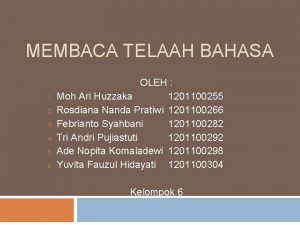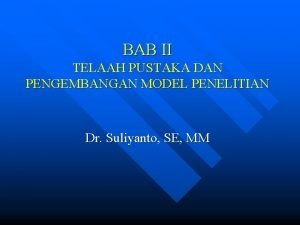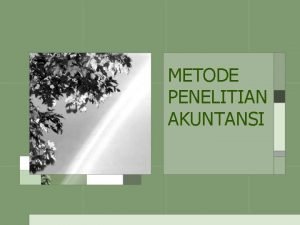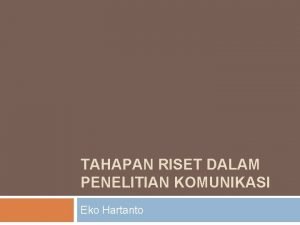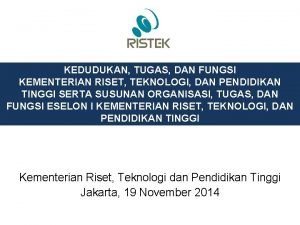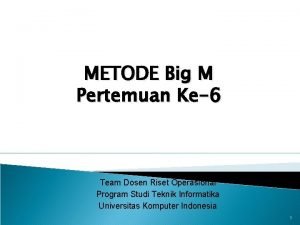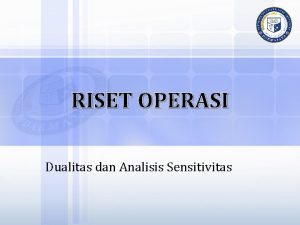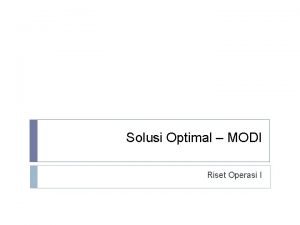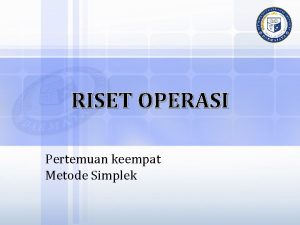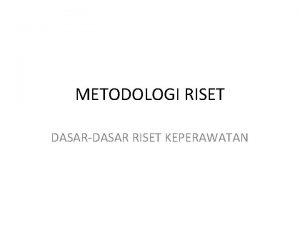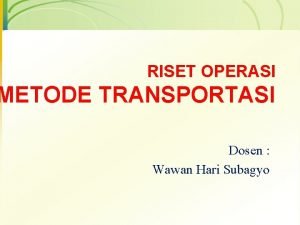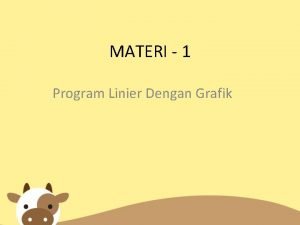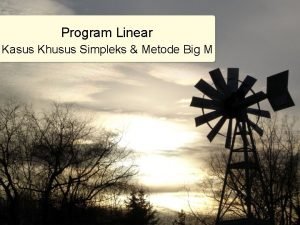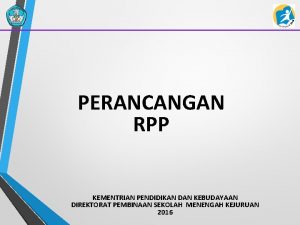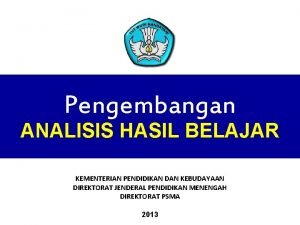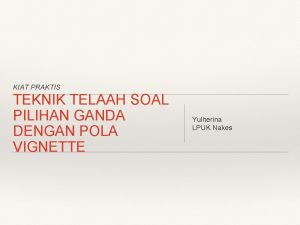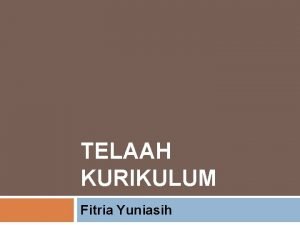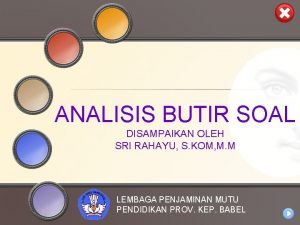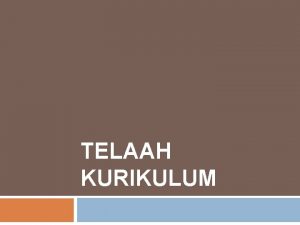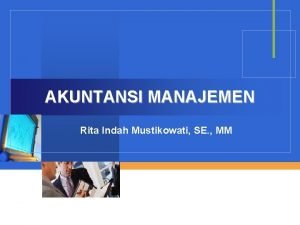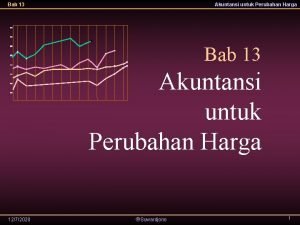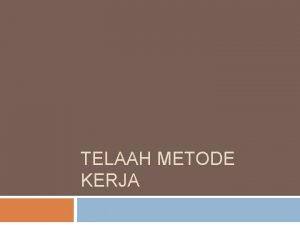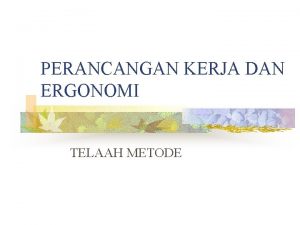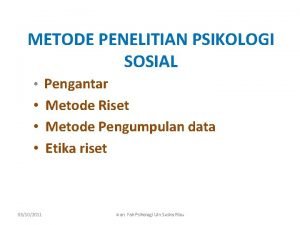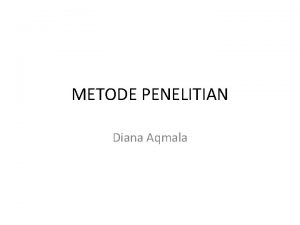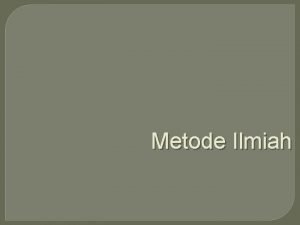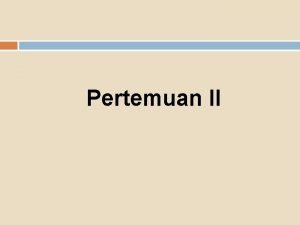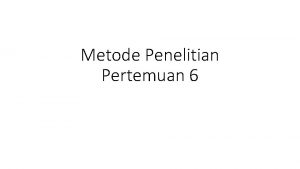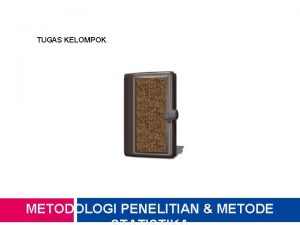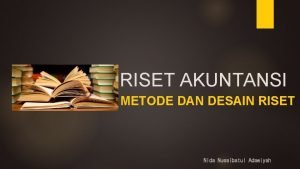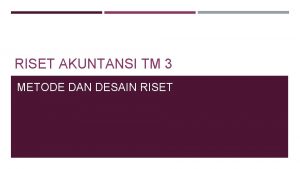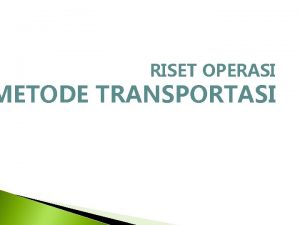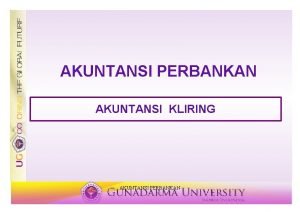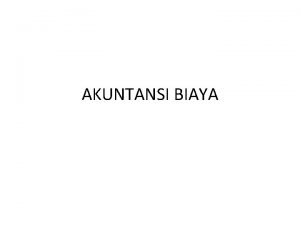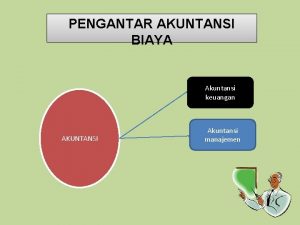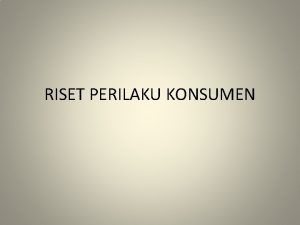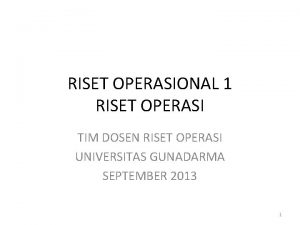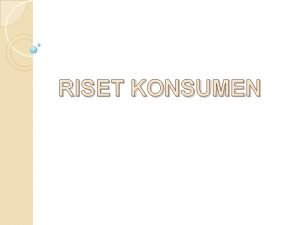METODE PENELITIAN AKUNTANSI Tugas Tugas Telaah Tugas Riset






















- Slides: 22

METODE PENELITIAN AKUNTANSI

Tugas • Tugas Telaah • Tugas Riset

Business Research • An organized, systematic, data-based, critical, objective, scientific inquiry or investigation into a specific problem, undertaken with the purpose of finding answers or solution to it.

Type of Business Research • Applied research – It is conducted to reveal answers to specific questions related to action, performance, or policy needs. • Pure or basic research – It aims to solve perplexing questions (that is, problems) of a theoretical nature that have little direct impact on action, performance, or policy decisions.

Purpose of Study • Reporting – Requires little inference or conclusion drawing in. • Descriptive – Try to discover answers to the questions who, what, when, where, and sometimes how. – Does not explained why an event occurred or why the variables interact the way they do.

Purpose of Study (Cont’d) • Explanatory – Goes beyond description and attempts to explain the reasons for the phenomenon that the descriptive study only observed. • Predictive – If we can provide a plausible explanation for an event after it has occurred, it is desirable to be able to predict when and in what situations the event will occur.

Good Research • Good research follows the standards of the scientific method 1. Purpose clearly defined The purpose of the research should be clearly defined and sharply delineated in terms as unambiguous as possible. 2. Research process detailed The research procedures used should be described in sufficient detail to permit another researcher to repeat the research; to estimate the validity and reliability of the data

Good Research (Cont’d) • Good research follows the standards of the scientific method (Cont’d) 3. Research design thoroughly planned The procedural design of the research should be carefully planned to yield results that are as objective as possible. 4. High ethical standards applied Reflect important moral concerns about the practice of responsible behavior in society

Good Research (Cont’d) • Good research follows the standards of the scientific method (Cont’d) 5. Limitations frankly revealed The researcher should report flaws in procedural design and estimate their effect on the findings. 6. Adequate analysis for decision maker’s needs Analysis of the data should be sufficiently adequate to reveal its significance and the methods of analysis used should be appropriate.

Good Research (Cont’d) • Good research follows the standards of the scientific method (Cont’d) 7. Findings presented unambiguously Presentation should be comprehensive, easily understood by the decision maker, and organized so that the decision maker can readily locate critical findings

Good Research (Cont’d) • Good research follows the standards of the scientific method (Cont’d) 8. Conclusions justified Conclusions should be confined to those justified by the data of the research and limited to those for which the data provide an adequate basis 9. Researcher’s experience reflected If possible, the research report should contain information about the qualification of this researcher

Scientific Thinking • Deduction A form of inference that purports to be conclusive – the conclusion must be necessarily follow from the reasons given. • Induction To draw a conclusion from one or more particular facts or pieces of evidence. • Combining induction and deduction

Deductive Reasoning Inner-city household interviewing is especially difficult and expensive This survey involves substantial inner-city household interviewing The interviewing in this survey will be especially difficult and expensive © 2002 Mc. Graw-Hill Companies, Inc. , Mc. Graw-Hill/Irwin

Exhibit 2 -1 Why Didn’t Sales Increase? Deduction

Concepts, Constructs & Definition • Concepts: a bundle of meanings or characteristics associated with certain events, objects, conditions, situations, and the like. • Constructs: an image or idea specifically invented for a given research and/or theory-building purpose. • Definitions Operational definition: a definition stated in terms of specific testing criteria or operations.

Variables • Independent variables • Dependent variables • Moderating variables: a second independent variable that is included because it is believed to have significant contributory or contingent effect on the originally stated IV-DV relationship

Variables (Cont’d) • Extraneous variables – Infinite number of variables has little or no effect on a given situation can be safely ignored – Extraneous variables as the control

Variables (Cont’d) • Intervening variables: the factor which theoretically affects the observed phenomenon but cannot be seen, measured, or manipulated; its effect must be inferred from the effects of the independent and moderator variables on the observed phenomenon

Propositions and Hypotheses • Proposition: a statement about concepts that may be judged as true or false if it refers to observable phenomenon • Hypotheses: proposition formulated for empirical testing – Descriptive hypotheses – Relational hypotheses

The Role of Hypotheses Guide the direction of the study Identify relevant facts Suggest most appropriate research design Provide framework for organizing resulting conclusions

Characteristics of Strong Hypotheses Adequate A Strong Hypothesis Is Testable Better than rivals

Theory and Models • Theory: a set of systematically interrelated concepts, definitions, and propositions that are advanced to explain and predict phenomena (facts). • Model: a representation of a system that is constructed to study some aspect of that system or the system as a whole
 Antonim adalah
Antonim adalah Contoh telaah pustaka
Contoh telaah pustaka Tugas metodologi penelitian akuntansi
Tugas metodologi penelitian akuntansi Tahapan riset penelitian
Tahapan riset penelitian Tugas kementerian riset, teknologi, dan pendidikan tinggi
Tugas kementerian riset, teknologi, dan pendidikan tinggi Contoh soal penugasan riset operasi
Contoh soal penugasan riset operasi Metode big m riset operasi
Metode big m riset operasi Contoh soal dualitas dan analisis sensitivitas
Contoh soal dualitas dan analisis sensitivitas Metode modi
Metode modi Pt bakery memproduksi 3 jenis roti kering
Pt bakery memproduksi 3 jenis roti kering Individualistis
Individualistis Metode transportasi riset operasi
Metode transportasi riset operasi Riset operasi program linear
Riset operasi program linear Simplex big m
Simplex big m Instrumen telaah rpp 1 lembar
Instrumen telaah rpp 1 lembar Kartu telaah soal pilihan ganda
Kartu telaah soal pilihan ganda Telaah soal pilihan ganda
Telaah soal pilihan ganda Telaah kurikulum smp
Telaah kurikulum smp Soal pilihan ganda telaah kurikulum
Soal pilihan ganda telaah kurikulum Kartu telaah soal pilihan ganda
Kartu telaah soal pilihan ganda Pengertian telaah kurikulum
Pengertian telaah kurikulum Sifat umum akuntansi keuangan dan akuntansi manajemen
Sifat umum akuntansi keuangan dan akuntansi manajemen Teori akuntansi bab 13 akuntansi untuk perubahan harga
Teori akuntansi bab 13 akuntansi untuk perubahan harga
